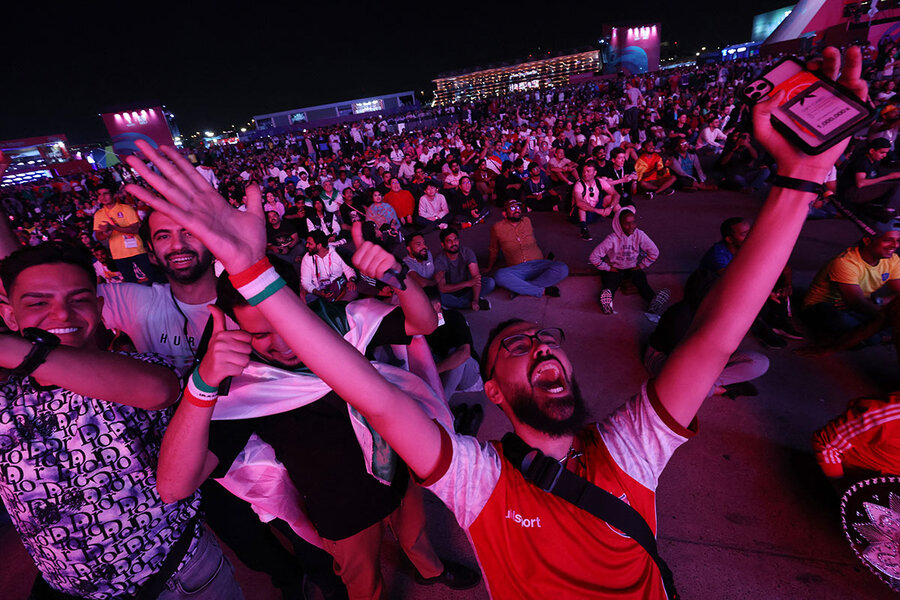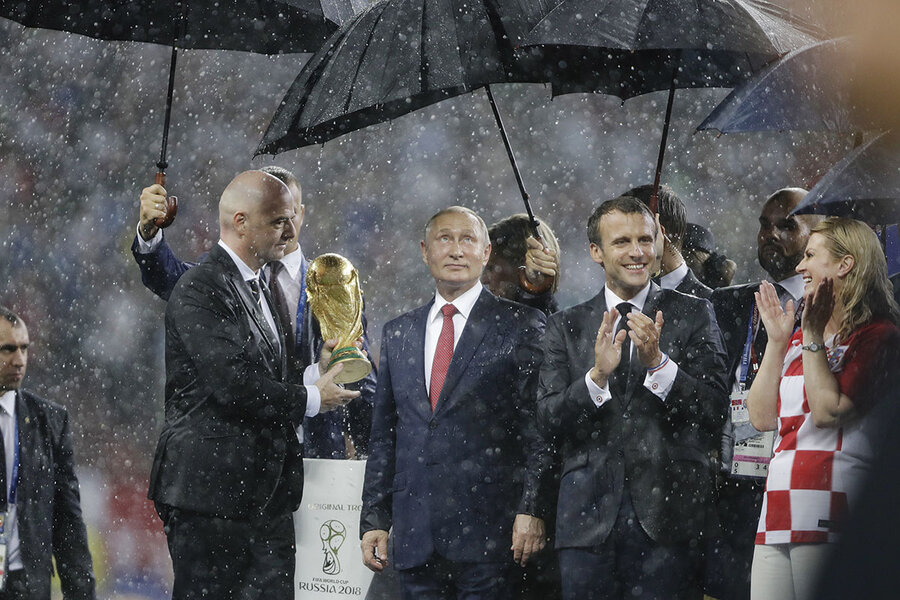
As the soccer World Cup kicks off this week in the tiny Gulf emirate of Qatar, it has come in for widespread criticism as a triumph of “sportswashing” – the use of a high-profile sports event to launder a government’s poor human rights image.
Qatar is notorious for its exploitation of foreign migrant workers, its restrictions of women’s rights, and its ban on LGBTQ relationships. But the controversy surrounding these issues in the run-up to the tournament suggests that sportswashing is increasingly likely to backfire: It is more likely to attract worldwide attention to the very things that the government would rather not talk about.
Why We Wrote This
Qatar stands accused of using the soccer World Cup to launder its poor human rights image. But such “sportswashing” is increasingly ineffectual as potential sporting hosts are judged by ever-higher standards.
World Cup organizer FIFA, which made Moscow the host of the 2018 tournament, is showing signs that it recognizes the need to address criticism of sportswashing. It put human rights questions to the finalists vying for the right to host the next World Cup, for example.
Qataris complain that their country, as the first Middle Eastern and Muslim host country, has been subject to unusually harsh criticism – much worse than Moscow suffered.
They are right. But the lesson of Qatar’s World Cup is that this may not be a result of double standards.
It is because the standards themselves have begun to change.
It’s the most widely watched sporting competition on the planet. Yet as the soccer World Cup kicks off this week in the Gulf Arab emirate of Qatar, the tournament is being denounced by critics as a triumph of “sportwashing” – using the glitter and glamor of high-profile sports events to launder a government’s denial of basic human freedoms.
That narrative may ring true over the next four weeks as hundreds of millions of fans worldwide turn their attention away from questions of human rights toward the fortunes of their own national teams.
But in the longer term, Qatar 2022 could well tell a different story.
Why We Wrote This
Qatar stands accused of using the soccer World Cup to launder its poor human rights image. But such “sportswashing” is increasingly ineffectual as potential sporting hosts are judged by ever-higher standards.
That’s because the swirl of political controversy in the run-up to this year’s competition has provided the latest sign of an important change.
Sportswashing is getting harder to pull off.
It’s increasingly likely, instead, to attract worldwide attention to the very issues the host countries, and the governing bodies of international sports events, would prefer not to talk about.
The change has been coming slowly – too slowly for the human rights activists who have been at the forefront of a yearslong campaign to highlight the hypocrisy of sportswashing.
But it has been gathering momentum. A number of the national teams competing in Qatar, especially the Europeans, have brushed aside appeals from FIFA, the sport’s governing body, to avoid political questions and just “focus on the football.”
They have added their own voices of concern over Qatari restrictions on rights for women, LGBTQ people, and the immigrant laborers who have worked, and in some cases died, in the emirate’s $200 billion drive to build stadiums, roads, and a metro system for the World Cup.
The example of the last World Cup, held in 2018 in Vladimir Putin’s Russia, has given added force to this message.
Before that event, too, human rights activists raised objections. Four years before it kicked off, Moscow had seized control of two eastern provinces of Ukraine and annexed Crimea. At home, President Putin was cracking down on dissent and on the LGBTQ community. Just weeks before the tournament, he sent agents to poison a former Russian intelligence officer in Britain.
FIFA’s response at the time was to echo the message that Moscow had used in 2010 to win the 2018 hosting rights: The World Cup would help speed Russia’s post-Soviet evolution into a “different nation” that would be “brothers and sisters to the whole family of the world,” to quote the official presentation.
For Mr. Putin, the tournament was indeed a success, showcasing his and his country’s power, ambition, and international stature. The verdict of millions of visiting fans was almost uniformly glowing.
But it’s hard to imagine a more powerful vindication of those who opposed giving Russia the World Cup than Mr. Putin’s full-scale invasion of Ukraine earlier this year.
Even before that invasion, FIFA had begun to show signs that it recognized the need to address sportswashing criticism of its award of consecutive World Cup finals to Russia and Qatar.
The year before the Moscow tournament, FIFA announced a formal commitment to internationally recognized human rights standards, and pledged to take human rights into account when choosing future host nations.
On the eve of the Moscow World Cup, FIFA applied the new approach for the first time. It raised specific human rights issues with the finalists vying to host the 2026 tournament, Morocco and the eventual victor, a joint-host bid involving the United States, Canada, and Mexico.
And the shift in emphasis has affected at least one aspect of Qatar’s politics as it embarked on its huge civil construction program: the treatment of the millions of immigrant laborers who make up nearly the entire workforce of the small, natural-gas-rich emirate. The Qataris abolished a system, known as kafala, which tied their work visas to a specific job, meaning they could not change jobs, nor leave the country, without their employers’ approval.
Qatar also issued a public assurance it would welcome all foreign fans, including LGBTQ visitors.
None of that, however, quelled mounting criticism in the weeks ahead of the tournament from rights groups, football teams, and fans’ organizations abroad, nor pressure for more changes in the treatment of foreign workers and the end of legal curbs on rights for women and LGBTQ people.
The Qataris were upset by what they viewed as double standards. They complained that the criticism surrounding their hosting of the 2022 World Cup, the first to be held in an Arab or Muslim country, had been far harsher than anything directed at Russia in 2018.
On that point, they’re right.
But the lesson of Qatar’s World Cup is that this may not be a result of double standards.
It is because the standards themselves have begun to change.

